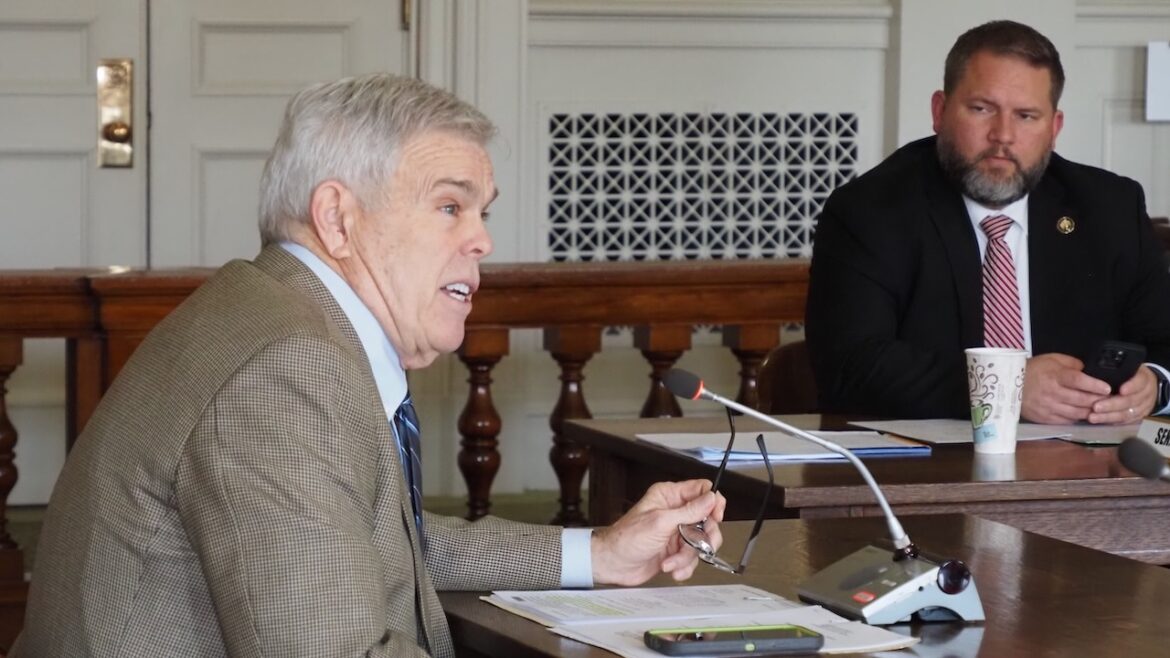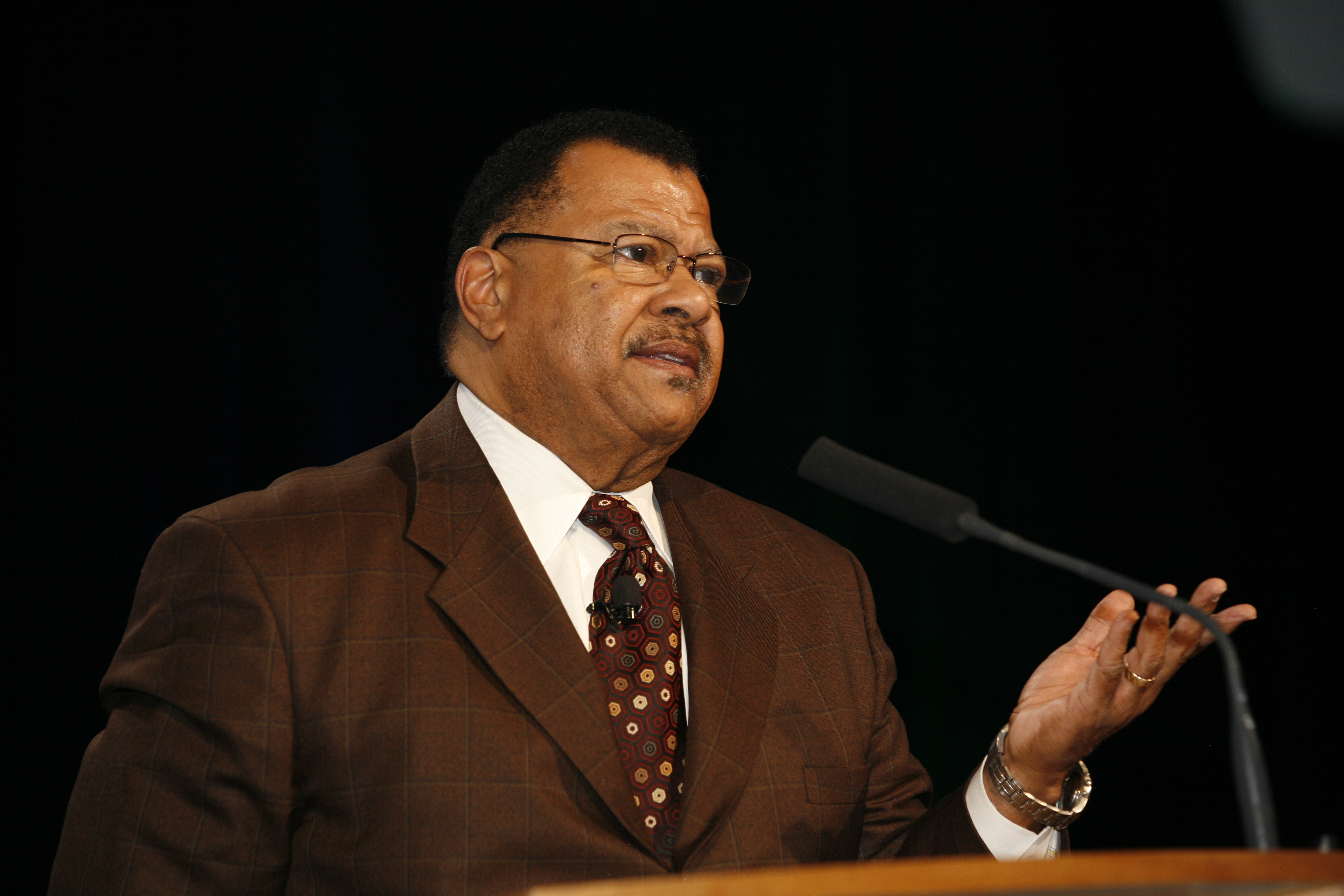Arkansas committee advances bill to abolish state library and PBS oversight boards

Mary Hennigan / Arkansas Advocate
Sen. Dan Sullivan, R-Jonesboro, presents a bill to the Senate Committee on State Agencies and Governmental Affairs on Thursday while Sen. Jim Dotson, R-Bentonville, looks on.
This article was first published by the Arkansas Advocate and is republished here under a Creative Commons license.
An Arkansas Senate committee on Thursday advanced a proposal to abolish the state boards that oversee public libraries and educational public television programs.
The full Senate will be next to hear Senate Bill 184, which would transfer the powers and authorities of the Arkansas State Library Board and the Arkansas Educational Television Commission to the state Department of Education. Both are already under the umbrella of the department but act independently.
Bill sponsor Sen. Dan Sullivan, R-Jonesboro, was among the five members of the Senate Committee on State Agencies and Governmental Affairs to vote to pass SB 184. He said the two boards “are very ineffective” despite handling business for two “very consequential” institutions.
“I think they would function better under the Department of Education and [be] more aligned with what the goals and missions of the legislative and executive branches do,” Sullivan said. “We fund them, we give them their money and we appropriate that money, and I expect these organizations to align their functions with how we allocate the funds.”
The Arkansas State Library Board oversees public libraries and disburses state funds to them on a quarterly basis, and the Arkansas Educational Television Commission oversees Arkansas PBS’ programs and finances.
SB 184 would not affect the funding or operations of Arkansas PBS or public libraries, Sullivan said. His wife, Maria Sullivan, has been on the Arkansas Educational Television Commission since June 2024, appointed by Gov. Sarah Huckabee Sanders.
Sen. Clarke Tucker of Little Rock, the committee’s only Democrat, voted against the bill. He said he believed the Arkansas State Library and Arkansas PBS should continue to have oversight that is independent of the Department of Education.
“The justification we have been given [for this bill] is just efficiency or alignment, and that’s just not a good enough reason,” Tucker said.

Misty Hawkins, executive director of the Arkansas River Valley Regional Library System, was one of two people and the only librarian to speak against SB 184. No members of the public spoke for the bill.
Hawkins said eliminating the State Library Board would threaten millions in federal grant funding that Arkansas receives from the U.S. Institute of Museum and Library Services. She also said SB 184 clashes with Sanders’ Arkansas Forward initiative, which aims to increase government efficiency.
“At this point, it remains unclear what specific problems this legislation seeks to fix or whether actual professionals in the [library] field were even consulted in the process,” Hawkins said.
Sullivan and libraries
Sullivan has been openly critical of public libraries and Arkansas PBS, and in recent years has sponsored legislation that would directly impact the finances and operations of both entities. He unsuccessfully tried to reduce Arkansas PBS’ spending authority in the 2022 and 2024 fiscal sessions.
In 2023, Sullivan said the Legislature should defund the Arkansas Library Association, which receives no state funds. ArLA is the state chapter of the American Library Association, a nonprofit trade organization that advocates for public libraries and helps them secure grant funding.
Another bill Sullivan is sponsoring, SB 181, would loosen the current requirement that library directors hold a master’s degree “from an accredited American Library Association program.” The bill would allow someone with “work experience in the field of library operations” but without a master’s degree to run a library with approval from its local governing board. It has yet to be heard by a committee.
Sullivan also has said the Legislature should “eliminate all the funding for public libraries that have the American Library Association in their policy” during this year’s legislative session. So far no lawmakers have filed a bill to create this policy.
Sullivan’s former Senate colleague, Jason Rapert of Conway, has been a member of the State Library Board since December 2023 and has repeatedly expressed support for its elimination. Rapert’s fellow board members have rejected his attempts to withhold funds from libraries with “sexually explicit” content accessible to children.
Act 372 of 2023, sponsored by Sullivan, would have given elected officials the final say over whether to relocate challenged library materials some consider “obscene” and made librarians legally liable for disseminating such materials. Parts of the law were temporarily and later permanently blocked by a federal judge; Attorney General Tim Griffin appealed the ruling last month.
PBS funding concerns
Arkansas PBS CEO Courtney Pledger spoke against SB 184, saying the agency would stand to lose funding via grants and donations if it no longer has an independent board.
Arkansas PBS’ funds include approximately $5.8 million from state general revenue, $2.5 million from the federal Corporation for Public Broadcasting and $1.7 million in private donations, CFO Jason Kunau said.

Losing funding would limit the network’s capacity to provide educational programming, particularly for children, as well as local sports broadcasts and emergency alerts, Pledger said.
“The bill threatens these essential services by transferring us to a department that, by nature, must have and does have other priorities,” Pledger said. “… Arkansas PBS is serving our Arkansas community increasingly well, and I would ask why we would disrupt a respected institution that is an example of efficient and cost-effective governance.”
Members of the Arkansas House mentioned PBS’ emergency alert system as an essential service during last year’s fiscal session when several members initially voted against the network’s fiscal year 2025 appropriation bill. The House voted the maximum of three times before the bill passed, as it had done in the 2022 fiscal session.
The Arkansas Educational Television Commission holds the network’s Federal Communications Commission license. Abolishing the board would require the Department of Education to go through the time-consuming and detailed license application process, Pledger said.
Sullivan said the only problem he could find in Pledger’s comments was that Arkansas PBS would “have to work really hard” to adjust to any changes that would come from abolishing its governing board.
“To say, ‘I’m afraid that my funding will be affected’ … is strictly a scare tactic,” Sullivan said.
He also mentioned the audits of Arkansas PBS’ finances that brought the network under legislative scrutiny in 2023. Its regularly scheduled 2022 audit indicated that administrators might have sidestepped state laws related to contract bidding.
A specially requested audit of the network’s expenditures, purchasing procedures and “internal controls” from July 1, 2021, to Dec. 30, 2023, concluded last year, with auditors referring the findings to a prosecuting attorney. Pledger told lawmakers in September that the agency had learned from its “mistakes and errors.”
Sullivan asked Pledger and other PBS officials last year if the network measures increases in students’ learning, test scores and the quality of Arkansas schools based on the reach of its grant-funded supplementary education programs. Pledger said she did not have a concrete way to measure those things.







